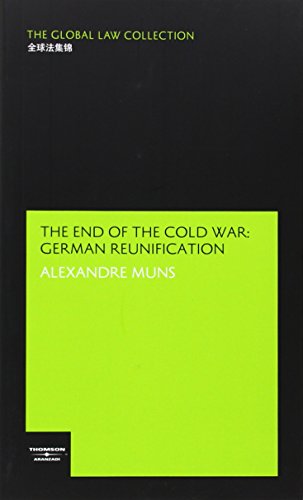The end of the Cold War
German Reunification
- ISBN: 9788483551776
- Editorial: Editorial Aranzadi
- Fecha de la edición: 2007
- Lugar de la edición: Pamplona. España
- Colección: The Global Law Collection
- Encuadernación: Rústica
- Medidas: 18 cm
- Nº Pág.: 215
- Idiomas: Inglés

Servicio de búsqueda de libros
Este libro está agotado o descatalogado por la editorial. Si lo desea podemos buscar esta obra en librerías de saldo y ocasión.
Sí, por favor búsquenme este libroIn this work Alexandre Muns analyzes and describes the political, economic and social forces and the roles played by politicians and high-ranking officials from the United States, the former Soviet Union, the Federal Republic of Germany, the former German Democratic Republic and other countries in enabling international diplomacy to achieve the historic success of peacefully reunifying Germany in less than a year as a fully sovereign and democratic state. Interviews with many of the key officials in the negotiations reveal how the western powers seized the opportunity presented by the popular democratic revolution in the GDR in 1989 to engineer German reunification on terms largely favorable to the West. Alexandre Muns Rubiol holds a PhD in Contemporary History from the University of Barcelona. He is a Lecturer in European Integration and International Economic Institutions at the Escola Superior de Comerç Internacional (Pompeu Fabra University, Barcelona) since 1997 and Head of Studies of the American Chamber of Commerce in Spain.
INDEX: 1. Introduction 2. The GDR's Communist leaders did not resort to force to prevent the downfall of the Communist regime 3. The unity Chancellor: How Helmut Kohl seized the window of opportunity for German reunification 4. Hans-Dietrich Genscher's role in the process 5. NATO's enlargement 6. The French and the British positions 7. The US position and the Soviet position 8. German reunification took place on the West's terms 9. Soviet non-interference during the downfall of the Communist regime in the GDR 10. The deal struck between Bush and Kohl and the design of the 2+4 formula 11. Why did Gorbachev accept the reunification of Germany? 12. Securing the reunified Germany's status as a member of NATO 13. NATO's enlargement since 1999 and the spirit of the treaty on German reunification signed in 1990 14. Final comments.






